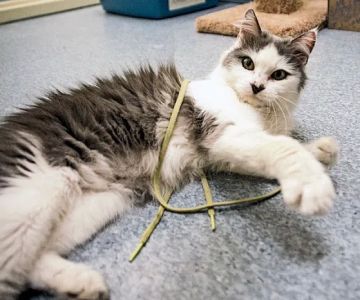How a Personalized Diet Changed My Pet’s Life
1. The Wake-Up Call That Made Me Rethink My Pet’s Diet
I’ll never forget the day my cat Max was diagnosed with early-stage kidney disease. He had always been a picky eater, but lately, he'd stopped finishing his meals altogether. I assumed he was just being finicky, but when I noticed his fur losing its luster and he seemed more lethargic, I brought him to the vet. That visit changed everything.
Max's bloodwork revealed his kidneys were beginning to fail. I was crushed. But thankfully, our vet recommended a nutritional counseling session. I honestly didn’t even know that was a thing for pets—until it quite literally changed Max’s life.
2. What Nutritional Counseling for Pets Really Means
When I first heard the term “nutritional counseling,” I imagined something like a fancy feeding chart or a list of premium pet food brands. But what I got was far more impactful. The veterinary nutritionist asked detailed questions about Max’s habits, activity levels, age, breed, and health history. From there, we developed a targeted diet plan that would support his kidneys, improve hydration, and maintain a healthy weight.
Nutritional counseling isn’t a luxury—it’s a crucial aspect of responsible pet ownership, especially in the U.S. where pet obesity and chronic illnesses are on the rise.
3. Common Dietary Mistakes I Didn’t Know I Was Making
3.1 Overfeeding “Healthy” Treats
I thought I was doing a good thing by giving Max grain-free treats. But it turns out, many of those were packed with fats and fillers that did more harm than good. Even with dogs, I've learned that popular chews or “natural” snacks can still be calorie bombs. Nutritional counseling helped me identify better treat options and control portions more effectively.
3.2 Misinformation from Pet Food Labels
Marketing on pet food packaging can be incredibly misleading. Terms like “organic,” “natural,” or “human-grade” don’t always reflect the quality or suitability for your pet’s needs. Our vet explained how to read labels critically—looking at protein sources, preservatives, and nutritional balance rather than catchy branding.
3.3 Assuming One Diet Fits All
Before nutritional counseling, I had Max and my dog Buddy on similar diets—because they both seemed “healthy enough.” But Buddy is a high-energy retriever, while Max is an older, sedentary cat with kidney sensitivity. I learned that each pet’s metabolism, age, and condition must shape their individual diet. One size definitely doesn’t fit all.
4. Real Benefits We Saw After Changing Max’s Diet
Within weeks of switching to the vet-recommended renal-support formula, Max began eating more consistently. His coat regained its shine, he was more playful, and his energy noticeably improved. Follow-up tests showed stabilization in his kidney values. I was amazed by how much his health turned around simply through diet.
We also added a water fountain to encourage hydration, limited sodium intake, and spaced meals throughout the day. These changes were easy to implement once I had a solid understanding of Max’s nutritional needs.
5. Why Every Pet Can Benefit from Nutrition Guidance
Nutritional counseling isn’t just for pets with medical issues. My neighbor's Labrador, Cooper, underwent a complete behavior transformation after a diet adjustment. He went from constantly scratching and shedding to having vibrant skin and increased focus—turns out, he had food allergies we wouldn’t have caught without professional input.
Whether your pet is overweight, has digestive issues, allergies, or just lacks energy, a nutrition-focused veterinary consult can make a major difference. Even healthy pets can benefit from preventive dietary planning, especially as they age or develop breed-specific sensitivities.
6. How to Start Your Pet’s Nutritional Journey
If you’re like me and unsure where to begin, the first step is simply asking your vet about nutritional support. Most veterinary clinics in the U.S. now offer specialized diet planning or can refer you to a veterinary nutritionist.
You can also monitor your pet’s weight, eating habits, and energy levels at home. Keep a food diary, note any unusual symptoms, and bring those details to your next vet visit. Early intervention and ongoing support are key to keeping your pet healthy through all life stages.
For expert guidance, tailored meal plans, and compassionate support, I highly recommend booking a session with Hidden Brook Veterinary. Their personalized approach made a lasting difference in Max’s health and our overall peace of mind. Your pet deserves the same.











